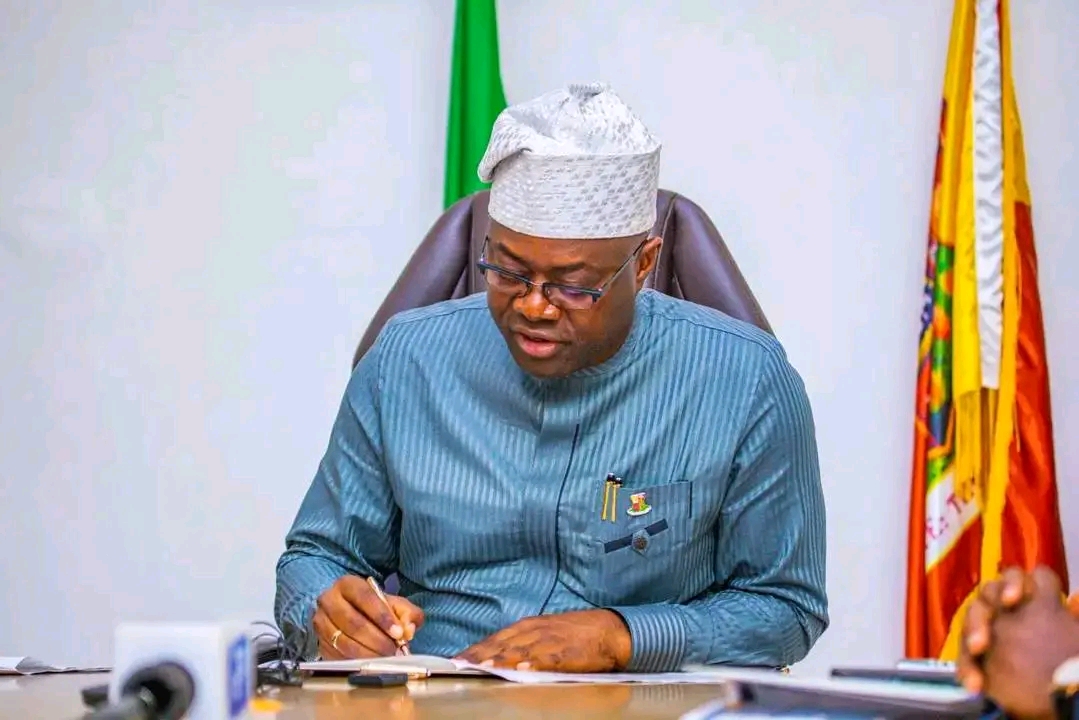As Nigeria inches toward another defining political season; the 2027 general elections, conversations about who can provide transformative, people-centered leadership are intensifying. Among those whose names now resonates resoundingly in national discourse is Governor ‘Seyi Makinde of Oyo State.
In this week’s Editor’s Diary, we reflect on why Makinde, the ‘godfatherless’ governor, is fast emerging as the archetype of a new leadership model—visionary yet pragmatic, daring yet grounded, and, most importantly, results-oriented.
Since assuming office in June 2019, Governor Makinde has not merely governed Oyo State, he has redefined governance itself. Under his leadership, Oyo State has transitioned from the politics of promises to a politics of delivery.
His two strategic blueprints—the Oyo State Roadmap for Accelerated Development (2019–2023) and the Oyo State Roadmap for Sustainable Development (2023–2027)—have set clear targets and measurable outcomes.
These frameworks form the backbone of a performance-driven administration that has delivered transformational results across sectors.
One of the most celebrated achievements of Makinde’s administration lies in the education sector. According to Dr. Nureni Adeniran, Chairman of Oyo State Universal Basic Education Board (OYSUBEB), during a recent inter ministerial press briefing, the government has constructed 60 model schools and 339 new classrooms,
renovated 443 classrooms and built 76 toilet blocks, distributed over 26,500 units of student furniture and free instructional materials, and recruited over 20,000 education personnel, including teachers and non-teaching staff.
Higher education also received a major boost with the state taking sole ownership of LAUTECH, upgrading Emmanuel Alayande College of Education to a university, and providing take-off grants ranging from ₦500 million to ₦1 billion to tertiary institutions.
Early childhood education, inclusive learning for special needs students, and scholarships for indigent students further underpinned Makinde’s inclusive education policy.
This extensive investment has led to over 50 percent increase in public school enrolment which is a clear indicator of restored confidence in public education.
Makinde’s healthcare reforms have both been expansive and empathetic. Some of its attained milestones include renovation and equipment upgrade of 209 Primary Healthcare Centres across all 351 wards, establishment of Neonatal Units, Geriatric Centres, Oxygen Plants, and Dialysis Centres, recruitment of over 750 healthcare professionals, growth in health insurance enrolment from under 70,000 in 2019 to over 255,000 in 2025, and launch of the SAfER Care Scheme for vulnerable populations and quarterly free medical missions among others.
These interventions demonstrate a governor who not only sees healthcare as policy but as a fundamental human right.
Governor Makinde has also delivered an unprecedented infrastructure agenda, constructing or rehabilitating over 700 kilometers of roads, including the iconic 76.7 km Iseyin–Fapote–Ogbomoso Road, the 12.5 km Theophilus Akinyele Way (dualised), as well as strategic road networks connecting Ibadan, Oke-Ogun, Ogbomoso, Ibarapa, and Oyo zones,
Transport infrastructure was further boosted with the construction of Flyovers and interchanges (e.g., General Gas, Adegbayi-Iwo Road, Challenge-Felele Junctions), subsidized Omituntun Mass Transit Buses, serving over 20,000 passengers daily
Makinde’s infrastructure focus has proven to be both developmental and unifying thereby, binding the state together for shared prosperity without leaving any part behind.
Understanding that development cannot thrive amid insecurity, Makinde established the Oyo Amotekun Corps, recruiting over 2,500 operatives and providing 400 operational vehicles,
bulletproof vests and armored carriers,
emergency 615 helpline and border patrol units, Safe Schools Initiatives and rural security architecture among others.
This approach is clearly indicative of a leader who does not outsource responsibility but leads from the front, an increasingly rare trait in today’s political leadership.
Under Makinde, Oyo State has emerged as a leading agribusiness destination in the whole of Nigeria, attracting ₦46 billion in private investments, including
establishment of the Fasola Agribusiness Industrial Hub, rehabilitation of moribund assets like the Pacesetter Quarry, and the planned development of Ijaye Agribusiness Hub.
According to OYSADA Director-General, Dr. Debo Akande, the government has also empowered over 25,000 farmers with inputs and training, disbursed ₦1.5 billion in low-interest loans via OYS-CARES and SAfER programs, and
supported vulnerable traders and artisans statewide among others.
These efforts demonstrate Makinde’s grasp of sustainable economic planning and inclusive growth that will create platforms for self sufficiency for the people while discouraging dependence on white collar jobs among youths.
Makinde’s people-first approach is also evident in bold social programs which include monthly gratuity payments to retirees (resumed in 2023), disbursement of bursaries to Law School and final-year students, wage awards to civil servants and retirees, free health insurance for over 40,000 pensioners and vulnerable groups, and infrastructure specifically targeted at people living with disabilities and the elderly.
These initiatives reflect a governor deeply connected to the needs of ordinary citizens regardless of their social status or economic class.
What makes Governor Makinde particularly remarkable is his political independence. He is a leader without the burden of godfatherism, an anomaly in Nigeria’s political space. Yet, he has built a legacy rooted in compassion, planning, execution, and empathy.
Makinde’s governance model has proven to be evidence-based, fiscally prudence, and driven by a bold willingness to make hard but necessary decisions for the greater good of not just his people but Oyo state as a whole.
In a country weighed down by economic turmoil, insecurity, educational decline, and infrastructural decay, Seyi Makinde has shown what is possible when purposeful leadership meets political courage.
He is not just a strong candidate for higher office in 2027, he is a proven leader who has delivered results. His achievements are not promises, but delivered projects; his governance not trial-and-error, but strategically executed; his vision not rhetoric, but a lived reality for millions.
Governor Makinde has earned his place in Nigeria’s future—not through endorsements, but through evidence. The country needs such a leader: godfatherless, grounded, and ready.

